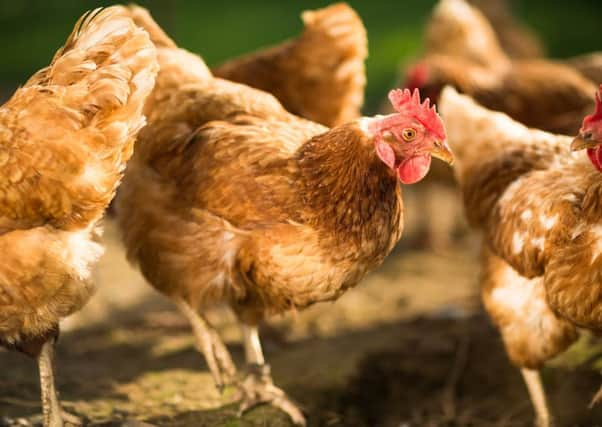Eggs lose free range labels after bird flu keeps chickens indoors


Millions of UK eggs are to temporarily lose their free range status after farmers were forced to keep hens in barns to limit the spread of bird flu.
An official avian influenza prevention zone was declared on 6 December, forcing owners to keep poultry and captive birds indoors or keep them apart from wild birds.
Advertisement
Hide AdAdvertisement
Hide AdThis has now ended, but some farms in higher risk areas have been advised to keep the strictest controls in place.
Under EU laws, eggs from birds which have been housed for more than 12 weeks cannot be marketed as free range.
All free range eggs will now be sold in packs marked with stickers highlighting the conditions they are being kept in.
The Department for Environment, Food and Rural Affairs (Defra) has advised it is adopting a more targeted approach, with the majority of producers allowed to let their birds outside if they observe strict disease prevention measures.
The latest advice allows egg producers in Scotland and Wales to assess the risks and make their own decisions on allowing flocks back outdoors.
However, around a fifth of those in England must adhere to the tightest restrictions.
Places close to large bodies of water where wild birds collect are deemed higher risk, so housing or netting will continue to be mandatory. Defra said around 75 per cent of poultry keepers will be unaffected, but some eggs will no longer be classed as free range.
A Defra spokesman said: “Strict disease control measures are currently in place to reduce the risk of the spread of avian flu in the UK, which means some birds are being kept inside for their welfare.
Advertisement
Hide AdAdvertisement
Hide Ad“Where birds are being kept inside, we have advised retailers that products must be clearly labelled so shoppers can make an informed choice.”
The British Egg Industry Council (BEIC), which represents more than 95 per cent of UK free range egg producers, said although not all poultry would be kept indoors, all members’ free-range egg packs will carry the stickers to avoid a “postcode lottery”.
Scotland produces around 1,400 million eggs annually – around 45 per cent from free-range hens.
Penny Johnston, poultry policy manager for NFU Scotland, added: “Individual free range egg producers in Scotland will ultimately make a decision based on their own business, the potential risks of disease, the ability to meet biosecurity requirements and the market for their eggs.
“The public, however, can be reassured that Scottish egg producers have the health of their flocks as their number one priority.”